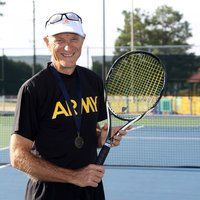Military Dentist Spreads the Value of Fitness
A military dentist has used his competitive spirit to thrive, in and out of the clinic.

You’re as old as you feel. And for Col. Jamie Houston, who for many years commanded the dental unit at the Ft. Jackson training base near Columbia, SC, being 62 must feel some days like 26.
That’s because Houston, who made a career as an army dentist, maintains a fitness profile that would make any 26-year-old envious. And the self-professed fitness and sports fanatic has done so his entire life.
“My mom told me, ‘We don’t have enough money to send you to college, so you’re going to have to make it on your athleticism and your academics,’” Houston recalls. “So that was always on my mind as far as a way to go to school.”
Houston would initially attend junior college on a basketball scholarship, but was also drafted by the New York Mets to play baseball.
“But my dad talked me out of that,” he says.
And to this day, he often—especially during the baseball playoffs—wonders ‘what if?’
“It would have been interesting to have been in that environment and see how well I would have done,” Houston admits.
Regardless, things didn’t turn out badly for him.
In His Blood
Houston was born at Travis Air Force Base, the son of an air force navigator. He moved around a lot, but recalls having a toothache at age 11. A dentist removed the tooth, and Houston was impressed with how gentle he was.
“I’m sure I had tears in my eyes when he took it out, but he was a role model for me for years to come,” he explains.
Regardless of Houston’s military roots, he says he enlisted in the army simply as a way to help fund his dental school education.
“I figured I’d pay my four years back and then get out,” Houston says. “But I loved it.”
Within his first year Houston got into airborne school. “I went from being a chair-born dentist to an airborne dentist.” And before he knew it, Special Forces asked him to travel with them to Honduras.
“That was a life-changing experience,” Houston recalls. “We were training Honduran soldiers, and they were competing heavily for my MREs (meals ready to eat). Americans hate those, but it was a source of nutrition for them and their families. That kind of poverty was striking.”
One day Houston was asked by one of the Honduran soldiers to come to his home to treat his wife.
“I said, ‘I really can’t do it. We don’t have any equipment to bring along,’” Houston recalls. “But he said, ‘Please, she just needs to see someone.’ So I went.”
Houston went home with the 23-year-old soldier to see his 20-year-old wife. They lived in a two-room house together with their one-year-old twins. The rooms had no floors, only dirt. That’s where the children played. And when Houston met the soldier’s wife, he found that her left eye was swollen shut from an abscess from a maxillary canine.
“It was then that I began to realize where my calling was,” Houston says. “We really couldn’t treat her, but it was vision threatening, so we were able to put a scalpel in there, achieve some drainage and put on antibiotics.”
Houston would receive a thank you from the solider in the form of a chicken.
“We eventually got it back to them because that was their source of eggs and nutrition,” he says. “But you can imagine how thankful they were, given what they didn’t have, to thank me that way.”
Fitness Fanatic
Houston may never have played for the New York Mets, but that didn’t deter him from competing. He started a softball team at Fort Bragg, in North Carolina—the largest military base in the world—comprised of dentists and dental technicians. They called themselves the Bad News Burrs, even though opponents referred to them as the Tooth Fairies. But they earned respect winning the regional tournament and capturing second place in the state championships.
Today, Houston is a 62-year-old multi-sport athlete who has been selected as a Humana Game Changer for serving as a role model to seniors—and people of all ages—for how to live a healthy life. In 2017, he’ll compete with more than 10,000 adults age 50-plus at the National Senior Games presented by Humana in Birmingham, Alabama.
“Health and wellness is key,” Houston says.
But his passion, he says, is to teach high school kids about investing and how to save money. That’s something he’s been doing since 2003. And while he lectured on the basics of investing, he also spoke about the importance of investing in themselves—including their physical health.
“I’ve been to so many countries where weight is not an issue; they barely have enough to eat,” Houston says. “But more importantly, they don’t have butter, they don't have mayonnaise, which is killing America. I just figured it was my duty to bring this information home.”
And Houston walks the walk, literally. He shows people photographs of where he parks when he goes shopping—the furthest he can get from the store. He also competes in multiple tennis tournaments throughout the year. But even though competing is still in his blood, health and wellness are at the heart of his message.
“I’ve sat next to people at the Senior Games who have lost 100 pounds,” he says. “And these are 85-year-old women saying, ‘I lost 100 pounds, and I want to lose another 10 before I die.”
Houston laughs as he recalls the conversation, adding, “But I don’t think they’re going to die at 85 if they’re winning these events.”
And it’s doubtful that Houston will stop competing.
ACTIVA BioACTIVE Bulk Flow Marks Pulpdent’s First Major Product Release in 4 Years
December 12th 2024Next-generation bulk-fill dental restorative raises the standard of care for bulk-fill procedures by providing natural remineralization support, while also overcoming current bulk-fill limitations.